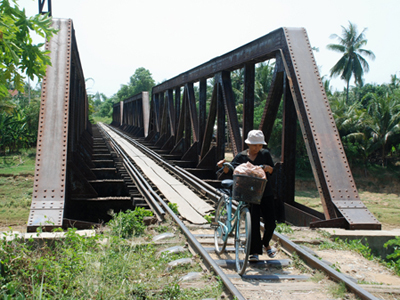By Lean Alfred Santos on 07 February 2014

In a rare admission, the Asian Development Bank has surprisingly acknowledged its own shortcomings following a controversial railway rehabilitation project in Cambodia that sparked complaints from thousands of displaced local residents affected by forced resettlements, insufficient compensations and neglect of their human rights.
The concerns were confirmed by the Compliance Review Panel, the bank’s internal review team, asserting that the program, which started in 2006, was non-compliant with the standard operational procedures and safeguards in its development projects, which include resettlement and public communication policies — something considered “damning” by a local NGO.
“I believe ADB put this statement out [a week before] in a deceptive effort to try to ‘manage’ the story before the CRP’s extremely damning report is released,” David Pred, managing associate of Phnom Penh-based Inclusive Development International, told Devex, adding that the bank should undergo a “mind shift” on how it treats people affected by its development projects.
The findings of the CRP report published on Friday outline the bank’s mishaps, particularly in managing the damaging effect of the project suffered by the local residents in Cambodia.
“Compensation paid from 2010 to 2011 was inadequate because it was based on the 2006 rates and did not take price increases over the intervening 5 years into account,” said the report. “Better guidance and support in the construction of new houses on the new resettlement sites could have reduced the risk of indebtedness of resettled households.”
It added: “The CRP concluded that these problems were the result of failure to implement ADB operational policies and procedures. The project was noncompliant with ADB’s involuntary resettlement and public communication policies, and its guidelines on operational procedures.” This is on top of other issues, including the death of three children in one of the resettlement sites in Battambang and Poipet.
This marks a rare occasion the Manila-based institution admits to major shortcomings in a development project in a partner country. The lessons learned, according to CRP, include the need for a stern message to ADB management that public disclosure, consultation and resettlement should be taken seriously, importance of having competent staff, and effective and independent project monitoring and evaluation.
Managing the crisis
In an attempt to implement damage control, ADB said it plans to provide proper compensation to the people affected and repair the damage “as soon as possible,” the bank noted in a statement.
The recommended plan of action include the establishment of a compensation deficit payment scheme in the range of $3 million to $4 million “for one-time additional compensation” to affected households, improved facilities on resettlement sites, improved grievance redress mechanism, development of capacity-building programs and the establishment of debt workout scheme to address indebtedness, among others.
The project — supported by a $42 million loan from ADB and a $21.5 million grant from AusAID — affected over 2,600 households or 11,288 people, of which over 3,500 will have to be relocated to the resettlement sites.
Despite ADB’s admission, the blame should not only fall on the bank alone, according to Pred and local NGO Khmer Institute for National Development founder San Chey.
“The Australian government must contribute to the remediation of harms caused by this project which it helped make possible. Australia has a duty of care to the affected people, both as project financiers and as the home of Toll Holdings,” Pred said, further explaining that one of the reasons Australia got into the picture was its interest to ensure Australian firm Toll Holdings secured the concession to operate the privatized railway.
Chey added: “All [the] fault is not only on ADB but the limit of accountability of the relevant state ministries and its line departments. The report on the affected citizen group must be well complied [with] and should be on the table for problem solving that involves local NGOs.”
Priority issues
Another underlying issue that surfaced in this controversy is the tug of war over maintaining a good relationship between the bank and the Cambodian government — and the welfare and development of the people on the ground.
In mid-2012, ADB commissioned resettlement expert Michael Cernea to assess the state of the displaced people in the resettlement areas. His report revealed that people were worse off once resettled due to increasing debt and land insecurity.
IDI said in its statement that the bank refused to disclose the report — mainly due to pressures from the Cambodian government — until it was finally released in March 2013. That decision, according to Pred, shows what ADB’s true priorities are.
“The suppression of Cernea’s independent monitoring report, and more importantly ADB’s failure to act on his recommendations, illustrates the tendency of ADB to place far more value on preserving its relationship with its borrowers than ensuring the welfare of [the] people harmed by its projects,” he said.
Moving forward, Chey suggested conducting specific and independent impact assessments and frequent face-to-face meetings between representatives of the bank, the government and the other stakeholders — a steep mountain to climb, especially in attempting to restore public trust in the project.
Pred however believes full rehabilitation and reconciliation with the people is not impossible in the long-run.
“It will not be easy to repair the harm that has been done because the problems have festered for so long, but it is essential that ADB provides the resources and the systems to deliver just compensation to all affected families, as well as jobs, infrastructure, and basic services to ensure their full rehabilitation,” he concluded.

No comments:
Post a Comment